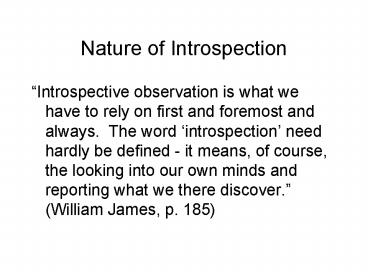Nature of Introspection - PowerPoint PPT Presentation
1 / 12
Title:
Nature of Introspection
Description:
Nature of Introspection 'Introspective observation is what we have ... cognitive dissonance theory. bystander intervention effect. People make up explanations ... – PowerPoint PPT presentation
Number of Views:1674
Avg rating:3.0/5.0
Title: Nature of Introspection
1
Nature of Introspection
- Introspective observation is what we have to
rely on first and foremost and always. The word
introspection need hardly be defined - it
means, of course, the looking into our own minds
and reporting what we there discover. (William
James, p. 185)
2
Types of Introspection
- Analytic introspection
- the reduction screen
- basis for sensory analysis, e.g., winetasting
- Descriptive introspection
- Interpretive introspection
- looking for causes of behavior
- Freuds self-analysis
3
Limitations of Introspection
- Forgetting
- Errors of reconstruction
- Filling in gaps
- Errors of verbalization
- Transforming image to word
- Distortions produced by observation
- Changing mental contents by looking
4
Conditions Affecting Verbal Reports
- Based on Ericsson Simon
- Favorable Conditions
- Information currently in STM
- Information in LTM but transferred back to STM
- Unfavorable Conditions
- Not attended, so not in STM
- Overlooked in STM
- Information in STM but not transferred to LTM
- Information cannot be retrieved from LTM
5
Limitations of Introspection, contd
- Demand characteristics
- task demands
- censorship)
- No independent verification
- Confusions between inference and observation
6
Introspective Methods
- Thinking out loud
- Cryptarithmetic DONALD GERALD ROBERT
- Thought sampling
- Report on thoughts at the moment of a cue
- Retrospective reports
- Event recording
- Diaries
- Group questionnaires
7
Mental Stereotaximetry
- Measuring the location of experiences in the
minds eye - 3 dimensional co-ordinate system
- Do all experiences occur in the same place?
- Visual
- Auditory
- Olfactory
- Computational
- Imagined scenario
8
Introspection as a Process
- Introspection is not
- primary consciousness
- a sensory process
- a brain scan
- an inference from behavior
- direct inner observation
- Introspection is
- retrospection
- the psychological moment
9
Problems with Introspection
- Nisbett Wilson (1977)
- Telling more than we can know Verbal reports on
mental processes - People dont know why they do things
- cognitive dissonance theory
- bystander intervention effect
- People make up explanations
- a priori beliefs about causes
10
Evidence for Introspection
- Correlations between subjective factors and
objective factors for actors vs. observers
11
Actors vs. Observers
- correlations are higher for actors than
observers, e.g., .42 vs .35 - partial correlation for actors, after controlling
for observers, is moderate, .31 - However, note that the difference is not huge
12
Privileged Information Covariation Assessment
- Covariation assessment How much is variation in
responding due to particular variation in
stimulus conditions? - Actors are more accurate than observers, when
- covariation is easily assessed































